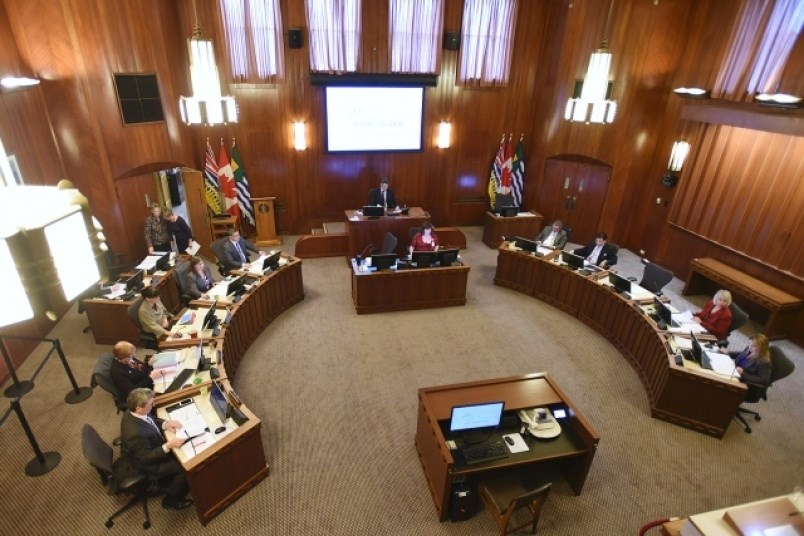Funding to pay for more firefighters and open a new community policing centre in Strathcona are included in a $3.5 million package of initiatives city council approved Wednesday to assist in combatting the unprecedented overdose drug crisis in Vancouver.
Council’s approval came despite pushback from speakers representing low-income people and drug users who argued that a policing centre would not directly have an impact on reducing the number of drug deaths in Vancouver, which reached 215 last year.
“Policing is not the answer and you, frankly, cannot police your way out of this,” said Karen Ward, secretary of the board of directors for the Vancouver Area Network of Drug Users. “An increased policing presence in our community will only drive these most vulnerable people into even more unsafe conditions and cut them off from the services that they need.”
The city will spend $100,000 to set up a community policing centre in a yet-to-be-determined location in Strathcona. An additional $128,200 will fund the centre’s annual operating costs. Council also agreed to boost funding by $20,000 a year to each of the 10 existing policing centres in Vancouver.
The biggest expense of the $3.5 million package is $1.9 million to add an additional three-person medic unit to Vancouver Fire and Rescue Services. Another $1.4 million will be spent on mental health and other supports to aid volunteers and others working on the frontlines of the opioid crisis. More training for city staff on how to administer naloxone, the overdose-reversing drug, is estimated to cost $10,000.
Ward said the $428,200 component dedicated to community policing could be better spent having peers connect with drug users, increase staff and hours at “overdose prevention sites” and set up drug injection rooms in single-room-occupancy hotels, where many people have died of drug overdoses.
“The sirens that we hear and the reports that we constantly get about people dying and overdosing and losing their friends and losing the people that they depend upon – this has become part of the very air that we’re breathing and it is literally choking us,” said Ward, who was supported in her views by Maria Wallstam of the Carnegie Community Action Project, who argued a policing centre in Strathcona will target drug users. Wallstam said the policing centre is being set up to placate property owners’ fears about a drop in property values because of the presence of drug users.
Vancouver police Supt. Michelle Davey told council that members of the Strathcona community have repeatedly requested a policing centre for their neighbourhood. That request, she said, included the community’s interest in assisting with the opioid crisis and supporting harm reduction measures, including two proposed supervised injection sites in the area.
“The citizens have asked for a place to gather, to develop programming and to assist with whatever they could do with respect to this opioid crisis,” Davey said. “That isn’t a far stretch from what community policing centres do in other communities. Community policing centres are focused on the needs of particular neighbourhoods.”
Both the Strathcona Residents Association and Strathcona Business Improvement Association had representatives speak to council in support of a policing centre.
“While a [policing centre] won’t solve the opioid crisis, we feel it will play an essential role in allowing people to take a more active role to address safety concerns in a way that is tailored to Strathcona,” said Joji Kumagai, executive director of the Strathcona Business Improvement Association.
Davey said the community policing centre will not operate as a police precinct but have one officer assigned to it. That officer will work with an executive director and volunteers who live or work in the community.
“The Vancouver Police Department plays a very-far-in-the-back-seat-of-the-theatre role in providing a conduit of information, a place to bounce things off of, but not an enforcement role,” Davey said.
Council’s three NPA councillors – George Affleck, Melissa De Genova and Elizabeth Ball – voted against setting up a community policing centre in Strathcona, arguing that the proponents and detractors of the facility were not properly consulted before the request came before council.
Affleck also argued the fire department should have made its $1.9 million request for a medic team in the budget process, not as an addition to its budget.
The ruling Vision Vancouver and Green Party Coun. Adriane Carr voted in favour of the $3.5 million package of investments, with Vision Coun. Kerry Jang saying of residents’ concerns about enforcement that the police department’s policies related to addictions, sex trade workers and mental health have fundamentally shifted over the years.
“It’s not the same old VPD.”
The $3.5 million budget for council’s investments came after council voted in December to raise property taxes by an additional 0.5 per cent. Council’s decision Wednesday was to decide how the money should be spent.
@Howellings



